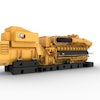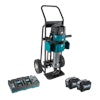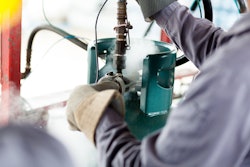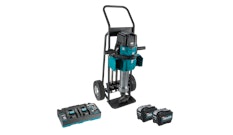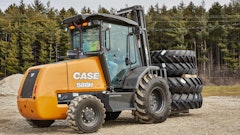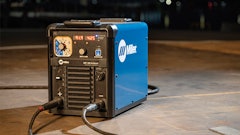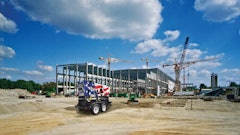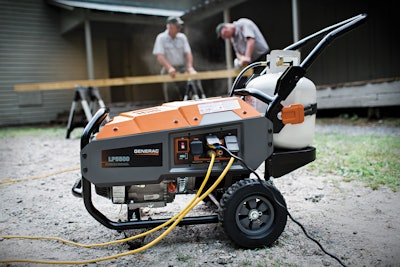
The fuel chosen to power jobsite equipment can be a game changer, impacting everything from operational costs and environmental impact to performance and reliability — and propane comes with a strong, strategic business proposition.
As construction professionals weigh their options and look for the best fit for their operation, they should consider what key perks propane has to offer. A growing number of professionals across various industries, including construction, are finding propane helps check all the important boxes as an energy source.
Notably, propane can provide reliable and versatile power for construction mainstays like jobsite heaters, light towers, forklifts, concrete trowels, backup generators and towable generators.
While operating propane, your crews will notice the following:
1. Improved Efficiency and Steady Performance
Construction professionals know the best jobsite equipment and energy sources are the ones that help maximize productivity. Propane is a highly portable energy source, allowing contractors to complete work without bringing in an alternative power source for electrical equipment.
Because propane can be stored on-site, it’s always accessible regardless of severe weather or other interruptions.
Propane’s grid independence allows teams to get mobilized and start work immediately — and is especially beneficial for jobsites that aren’t yet connected to utilities or are located off the grid entirely.
Not only does propane allow crews to work away from the grid or far from an outlet, but it also eliminates restrictions and safety hazards brought on by electric cords. Propane-powered equipment gives contractors more freedom of movement and, ultimately, allows work to get done faster and more efficiently.
Beyond its ease and flexibility, propane engines also provide consistent and steady power output, which is ideal for construction equipment that requires a reliable energy source to maintain productivity. Compared with its counterparts, propane engines also start reliably in cold weather, minimizing delays year-round.
Plus, when it comes time to refuel, cylinders can quickly and easily be swapped out before getting back to work. The ability to refuel onsite reduces the need for trips to offsite fuel stations and keeps the crews’ machinery running longer.
Crews working with a local propane supplier can even establish a personalized refueling schedule, ensuring they never run dry or bring work to a halt.
2. Reduced Emissions
Adopting propane-powered equipment can also improve work environments and air quality, aligning with growing sustainability goals in the industry.
Deemed an approved clean alternative fuel by the Clean Air Act, propane produces significantly fewer emissions compared with other options, like diesel, gasoline and even electricity. Because of this, it’s able to be used both indoors (with proper ventilation) and outdoors — translating to even more gains for crew productivity.
Data from the Propane Education & Research Council (PERC) shows that propane-powered small-engine job site applications can reduce greenhouse gas emissions by up to 17% and sulfur oxide (SOx) emissions by up to 16% compared with gasoline-fueled models.
Propane equipment also emits fewer nitrogen oxide (NOx) emissions than equipment powered by electricity, gasoline, and diesel. Moreover, using propane produces 43% fewer greenhouse gas emissions than using an equivalent amount of electricity generated from the United States grid. And because of its clean-burning characteristics, construction professionals can rely on fewer maintenance requirements than diesel or gasoline engines, reducing downtime for repairs or fueling.
Plus, propane is only getting cleaner with the development of renewable propane, which is made from a variety of renewable feedstocks, primarily camelina plant oil, vegetable oil, animal fats or used cooking oil, though it can also be made from soybean oil and animal tallow.
Renewable propane’s chemical structure and physical properties are the same as traditional propane, meaning it can be used for all the same applications without any modifications to engines or equipment—and offers the same benefits, like reliability, portability, and power.
Additionally, it can be used alone or in innovative blends with other renewable or low-carbon energy sources — including conventional propane — to further reduce carbon emissions without sacrificing on performance and while meeting any budget.
3. Short- and Long-Term Cost Savings
Time is money in the construction industry. Unlike other energy sources, environmental protection and enhanced productivity don’t have to come at a cost when it comes to propane.
Propane can help save on maintenance and fuel costs over time, eliminate infrastructure costs, and avoid expensive costs associated with batteries. Additionally, propane equipment generally lasts longer than electric equipment, making it more cost-effective in the long run.
Construction professionals using propane-powered equipment can further protect themselves from market fluctuations by securing a fuel contract with their local propane supplier. The fuel contract can provide an advantage in forecasting annual costs by locking in a set price per gallon for both short-term and long-term fuel needs.
4. Enhanced Safety
The use of propane is often accompanied by well-defined safety guidelines and training, helping crews understand proper handling, storage, and emergency procedures. Plus, businesses operating propane-powered equipment are contributing to employee safety and wellbeing by ensuring better air quality.
Fuels that produce fewer pollutants, like propane, improve air quality on the jobsite, contributing to the health and safety of workers by minimizing health risk associated with inhaling harmful fumes.
Some fuels, like propane or electricity, can also be quieter than traditional diesel, reducing noise pollution and improving working conditions. Propane tanks are generally easier for crews to handle and transport, too, compared to fuel drums. Many propane systems are designed for quick connections and disconnections, which reduces the chances of spills or accidents.
Next Steps and Resources
If you’re looking to make the switch and adopt this clean energy source, work with your local propane supplier to have propane tanks installed and establish a refueling schedule. A local propane supplier is your best resource and energy advocate while you get started — and for years to come.
Notably, local propane suppliers can alert you of any financial incentives or rebates and provide training and education to crews on safe handling and operation. Asking the right questions upfront will help set expectations and ensure your experience getting started with propane is quick and easy.
Michael Newland is director of agriculture business development at the Propane
Education & Research Council (PERC).
Visit propane.com.

